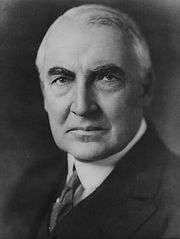United States Senate election in Ohio, 1914
| | |||||||||||||||||||||||
| |||||||||||||||||||||||
| |||||||||||||||||||||||
|
| |||||||||||||||||||||||
| County results | |||||||||||||||||||||||
| |||||||||||||||||||||||
| Elections in Ohio | ||||||||||
|---|---|---|---|---|---|---|---|---|---|---|
.svg.png) | ||||||||||
|
||||||||||
|
|
||||||||||
The 1914 United States Senate election in Ohio was held on November 3, 1914. Republican nominee Warren G. Harding, future President of the United States, defeated Democratic nominee Timothy S. Hogan to succeed retiring incumbent Republican Senator Theodore E. Burton.[1]
Candidates
Democratic
Republican
- Warren G. Harding, former State Senator and Lieutenant Governor of Ohio[2]
- Joseph B. Foraker, former Governor of Ohio and U.S. Senator[3]
- Ralph D. Cole, former U.S. Representative[4]
Campaign
Initially, Harding was not interested in running for U.S. Senate, due to the divisive remnants of the 1912 elections between the conservative and progressive factions of the Republican party. Harry Daugherty, an Ohio political boss, was interested in running for the seat himself upon learning of incumbent Senator Theodore Burton's plans to retire upon the expiration of his term, but party leaders advised him not to run. Instead, Daugherty unsuccessfully attempted to stage a draft movement to convince Harding to run for the seat. After the death of Amos Kling, the father of Harding's wife Florence, she encouraged her husband to run. The precise reasoning for this is unknown, but some in Marion, the Hardings' home town, believe that Harding had agreed not to seek higher office as part of a reuniting "truce" between Florence and her father, or that Kling had convinced Harding that it would behoove him to further his business rather than run for public office.[4]
Although Daugherty claimed it was him who had convinced Harding to run for the Senate, Harding's friend and attorney Hoke Donithen, who eventually became Harding's campaign manager, may have played a role in his decision to run. Retiring Senator Theodore Burton also claimed credit, saying to his biographer that Daugherty did not agree to throw his support behind Harding until after learning he had backed him.[4]
The Republican primary was a three-way contest between Harding, former U.S. Senator and ex-mentor Joseph B. Foraker[5] and Ralph Cole. Rather than antagonizing his opponents, Harding notably tried to keep and make friends within the Republican party, to the frustration of those running against him. Ralph Cole, in his frustration, said, "If he is not going to fight someone, why did he enter the contest?"[4] Harding eventually defeated both of his opponents in the primary, garnering 88,540 votes. Foraker finished in second with 76,817 votes, ahead of Cole with 52,237.[4]
In the general election campaign, Harding faced Democratic nominee Timothy Hogan and Progressive candidate Arthur Garford. Hogan was subject to anti-Catholic sentiment among voters, which Harding himself did not exhibit during the course of the election. Harding's supporters accused Hogan of wanting to "deliver Ohio to the Pope."[6] Harding downplayed the issue of World War I, despite the fact that the election took place just after the outbreak of the war, due to the high German immigrant population. Harding ultimately won the election and subsequently became the first United States Senator from Ohio to be popularly elected, following the passage of the 17th Amendment to the Constitution.[5]
Harding's victory in his bid for the Senate seat raised speculation that he would seek higher office, specifically the Presidency, although Harding himself did not show any interest in doing so at the time. He told family and friends after being elected to the Senate that he would return to his previous career in newspaper publishing at The Marion Daily Star after serving in the Senate.[4]
Results
| Party | Candidate | Votes | % | ± | |
|---|---|---|---|---|---|
| Republican | Warren G. Harding | 526,115 | 49.16 | ||
| Democratic | Timothy S. Hogan | 423,742 | 39.60 | ||
| Progressive | Arthur L. Garford | 67,509 | 6.31 | ||
| Socialist | E.K. Hitchens | 52,803 | 4.93 | ||
| Majority | 102,373 | 9.56 | |||
| Turnout | 1,070,169 | ||||
| Republican hold | Swing | ||||
See also
References
- 1 2 Dubin, Michael J. (1998). United States congressional elections, 1788-1997 : the official results of the elections of the 1st through 105th congresses. Jefferson, NC [u.a.]: McFarland. p. 407. ISBN 0786402830.
- ↑ "HARDING, Warren Gamaliel, (1865 - 1923)". Biographical Directory of the U.S. Congress. Retrieved 12 June 2012.
- ↑ "FORAKER, Joseph Benson, (1846 - 1917)". Biographical Directory of the U.S. Congress. Retrieved 12 June 2012.
- 1 2 3 4 5 6 Dean, John W. (2004). Warren G. Harding (1. ed.). New York: Times Books. pp. 34–37. ISBN 0805069569.
- 1 2 Russell, Francis (1962). The Shadow of Blooming Grove: Warren G. Harding In His Times. Easton Press. ISBN 0-07-054338-0.
- ↑ "Life Before the Presidency". American President: Warren Gamaliel Harding. American President: A Reference Resource. Retrieved 12 June 2012.
- ↑ "OH US Senate". OurCampaigns. Retrieved 12 June 2012.

.png)
